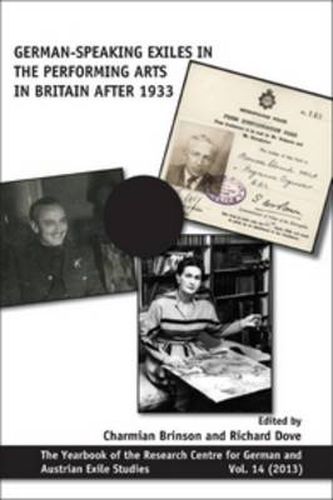Readings Newsletter
Become a Readings Member to make your shopping experience even easier.
Sign in or sign up for free!
You’re not far away from qualifying for FREE standard shipping within Australia
You’ve qualified for FREE standard shipping within Australia
The cart is loading…






This volume focuses on the contribution of German-speaking refugees from Nazism to the performing arts in Britain, evaluating their role in broadcasting, theatre, film and dance from 1933 to the present. It contains essays evaluating the role of refugee artists in the BBC German Service, including the actor Martin Miller, the writer Bruno Adler and the journalist Edmund Wolf. Miller also made a career in the English theatre transcending the barrier of language, as did the actor Gerhard Hinze, whose transition to the English stage is an instructive example of adaptation to a new theatre culture. In film, language problems were mitigated by the technical possibilities of the medium, although stars like Anton Walbrook received coaching in English. Certainly, technicians from Central Europe, like the cameraman Wolf Suschitzky, helped establish the character of British film in the 1950s and 1960s. In dance theatre, language played little role, facilitating the influence in Britain of dance practitioners like Kurt Jooss and Sigurd Leeder. Finally, evaluating the reverse influence of emigres on Germany, two essays discuss Erich Fried’s translations of Shakespeare and Peter Zadek’s early theatre career in Germany.
$9.00 standard shipping within Australia
FREE standard shipping within Australia for orders over $100.00
Express & International shipping calculated at checkout
Stock availability can be subject to change without notice. We recommend calling the shop or contacting our online team to check availability of low stock items. Please see our Shopping Online page for more details.
This volume focuses on the contribution of German-speaking refugees from Nazism to the performing arts in Britain, evaluating their role in broadcasting, theatre, film and dance from 1933 to the present. It contains essays evaluating the role of refugee artists in the BBC German Service, including the actor Martin Miller, the writer Bruno Adler and the journalist Edmund Wolf. Miller also made a career in the English theatre transcending the barrier of language, as did the actor Gerhard Hinze, whose transition to the English stage is an instructive example of adaptation to a new theatre culture. In film, language problems were mitigated by the technical possibilities of the medium, although stars like Anton Walbrook received coaching in English. Certainly, technicians from Central Europe, like the cameraman Wolf Suschitzky, helped establish the character of British film in the 1950s and 1960s. In dance theatre, language played little role, facilitating the influence in Britain of dance practitioners like Kurt Jooss and Sigurd Leeder. Finally, evaluating the reverse influence of emigres on Germany, two essays discuss Erich Fried’s translations of Shakespeare and Peter Zadek’s early theatre career in Germany.